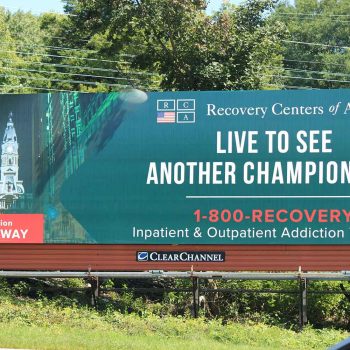“Live to See Another Championship” reads a Recovery Centers of America billboard near our Devon, PA facility. Recently, we received feedback that this advertisement was felt to be insensitive by a few individuals in our community. The advertisement is set in a dark green color and is clearly, to most, a nod to the Eagles’ 2018 Super Bowl championship and a plea to the thousands of people in our area suffering from addiction to get immediate treatment for what is increasingly a fatal disease.
It was hard to ignore the public reaction to the Eagles championship run. It was 60+ years of pent up joy and frustration held by millions of Eagles fans all over the tri-state area. Over 700,000 fans (3.5 million if you ask Howard Eskin) poured onto Broad Street last February to celebrate. The exaltation of an Eagles championship brought an electric energy to the city.
It’s no surprise to anyone that spirits are high in Philadelphia when our teams are winning. People are friendlier. We act more like a community. Life in the Philadelphia area is fortified by our communal love for sports.
However, the darker side of recent years is that in 2017, 1,217 people lost their lives in Philadelphia to a fatal drug overdose; over 5,000 in Pennsylvania. In the same year we celebrated arguably our greatest achievement since the signing of the Declaration, we lost 1,217 brothers and sisters to drug overdose. Philadelphia’s overdose rate in 2017 was among the highest of any large city in the world. In the world.
At RCA, we have a saying that goes something like, “Alcoholism is deadly – on its own, it’s a walk to the grave. Heroin and fentanyl, on the other hand, are a sprint to the grave.” The use and abuse of highly potent – and deadly – synthetic opioids such as fentanyl has greatly exacerbated the death toll of drug use in our city. Reporters throughout the Northeast have reported on Philadelphia’s status as the “Walmart of Heroin.” The DEA reported that fentanyl is the drug most present in overdose deaths and that it’s in 97% of counties in the state. We all know we have a problem.
To its credit, the City of Philadelphia has made tremendous strides in its efforts to safely and effectively treat the hundreds, if not thousands, of our neighbors who are homeless and addicted to drugs. Late last year, via Executive Order from Mayor Kenney, the City released its short- and long-term goals, dubbed The Philadelphia Resilience Project, to serve the most affected among us living in Kensington. These same people targeted for assistance are the ones who fill the ominous stat sheet. Major integrated efforts like this are helpful in two ways: The financial backing and manpower of the City’s efforts alone bring needed help to the area. But more importantly, they lend a symbolic air of approval for all of us to recognize the severity of the issue and act accordingly.
In days past, addiction was something that people either pretended didn’t exist, or could be treated at home with a cold-turkey detox. That’s just simply not the case with the highly-potent opioids we now so frequently see. These drugs kill – quickly. At our Devon location in 2018, we treated over 1,000 patients for opioid addictions, most which are under the age of 35 and are males.
As a company with a stated goal to Get One Million Americans into Meaningful Recovery, it is our imperative to treat all age groups. This group, however, is especially difficult to speak to. Consider the predicament of a mid-20s young man addicted to heroin. Treatment is often very unattractive. Many believe they’re beyond hope or restoration and see no path forward for themselves. We instill hope in these patients every day. We provide excellent medical and clinical care, no matter the background or story. And often, we must consider ways to make relevant cultural ties to this young person in order to break down their refusal to seek treatment.
The bottom line is that addiction treatment saves lives. We are saving lives from opioid and alcohol addictions every day. Keeping more of our brothers and sisters here with us. Preventing unnecessary deaths from drug overdose.
Our goal is to allow each of our patients to achieve their definition of success and happiness. This may or may not include being around for the next Eagles championship. That part isn’t relevant. What is relevant is changing the public perception of addiction being a second-class disease which has pushed so many into dark corners of our city to avoid treatment. Let’s quit knocking each other’s attempts to perform a noble service and instead focus on the fact that we have a tremendous amount of work left to do in eradicating Philadelphia’s opioid epidemic.




